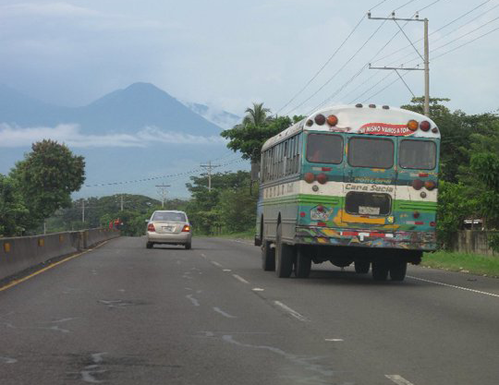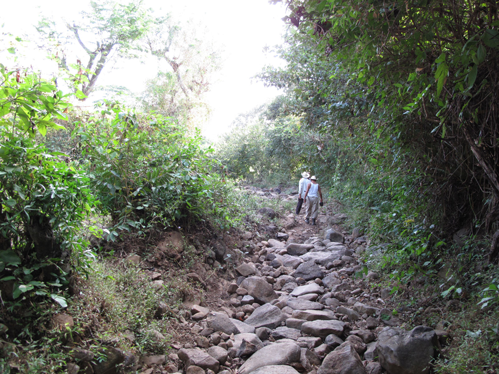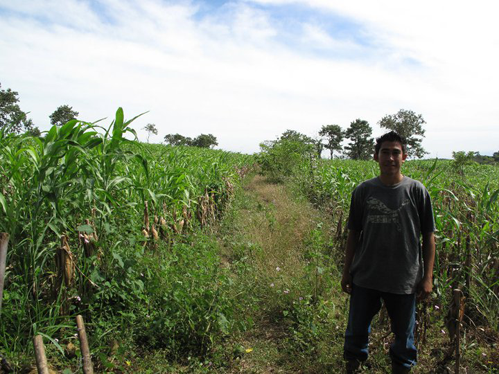Barriers

Myles McCormick is a volunteer intern on the 4th month of a one year learning and work placement in El Salvador. Myles works with World Accord’s partner, ADCASMUS, supporting income generation and educational projects. His placement is a joint collaboration with the World Service Corps. Myles writes periodic blog entries and tweets for World Accord’s website.
Lessons in Life from North America
The summer before ninth grade my grandfather suggested to me that I ought to come and work for him during the summer vacation. To me, this sounded like no vacation (you know, away from school and away from work) at all. Each Monday I would reluctantly be dropped off by my dad with a bag stuffed with clothes for the week. My grandfather, Papa Gene, would have random home improvement and gardening tasks assigned in his impossibly illegible dentist’s script that only my discerning grandmother could, with her reading glasses and a cup of coffee, as her Urim and Thummin, decipher.
During my servitude I made sure to: raid the pantry, daily, always searching specifically for chocolate (what good dentist does not keep a healthy supply of sugary sweets for when company visits?), and drink as much diet soda as I could find. By noon I might finally have begun to start the day’s work. By, ‘work,’ I mean that I would start any number of projects without having completed a single one due to some type of obstacle – “I can’t find the screw”, “I can’t reach the light bulb”, “I can’t tell if the hedge is straight,”… I can’t, I can’t, and I can’t! Papa Gene quickly christened these days as “Barrier Removal – 101”.
Realities of Life in El Salvador
It happened in these days of removing barriers, that I was instructed that literally anything that I want to do, I have the ability to do. If I think anything is standing in my way, I am exactly right: I only think it is obstructing my path. If I would just, “Dig down deep!” he would shout while shoveling imaginary dirt, I could overcome any problem. I never forget that. Though I never officially received a diploma from Papa Gene or even made it to “Barrier Removal – 102,” my worldview is considerably different now than it might have been without the strong love of my grandparents.
I have a tendency of approaching situations thinking that anything is possible if I put my mind to it. Coming to El Salvador, I’ve met people who have not had the same levels of privilege or opportunities that I have had and I had my first introduction to true barriers – barriers blocking or denying people the access to options for their life. At first, I thought this was absurd. We are not going to work today because of rain? After the seasonal rains finally stopped in early October, I had a chance to finally understand. The “roads” leading to some locations are not much more than rutted mud pathways. But how many people have no choice and must make this walk to town to buy milk, to their farm to care for pigs, or to school to receive what education is available.
One foundational challenge to development work in El Salvador (as with nearly all developing regions of the world), that, or any type of work for that matter, is the lack of infrastructural support. What I mean is there is a simple lack of the basic permanent installations that provides access to public works such as water, telephone lines and roads. The lack of landline telephones: nearly everyone has a cellular phone in El Salvador. Aside from mere convenience, I have heard many stories of thieves stealing the phones lines between buildings to sell the wire for cash.

Barriers to Development
While talking to my dad recently about the challenges in meeting the public works needs, he commented, “It’s as if they have all of the technology of the twenty-first century [internet, cell phones, cable and satellite television], without the framework of public services to support their basic needs.” I think he was exactly right. In racing to catch up with the rest of the “developed world” the necessary bedrock of a well-served society has been bypassed by business owners (both domestic and foreign – the majority from the United States, China, and South Korea) and continues to be disregarded by the government in favor of profits. In my mind the state government actively supports this inward self-exploitation and turns truly blind eyes of justice toward those who need it the most: the average factory worker.
I have had conversations with Javier, who works in a sweat shop in La Libertad. The owners of the factory where he works are of a certain political affiliation and he has seen the guard outside the front gate denying workers entry to the plant if they happen to be wearing even the colors of the opposition party. Another gentleman that he used to work with came to him, in confidence, about certain injustices that were going on in the workplace; the next week the man was found dead, poisoned, in his home. I relate this story to show how institutions respond to activities they believe to be counter to their well-being.
I have never heard a story of a factory or business ensuring the well-being of its employees. I think this because it is not seen as a financially profitable practice. But this energy that changes from maiz, chemical fertilizers and pesticides, to tortillas, to fabricated materials made in the factories and sweat shops, and is finally exchanged for the dollars that go to the owners of the large business and government officials who oversee them, rarely ever makes its way back into the communities from which it came – meaning those who feel there is no alternative to working in the sweatshops and factories (the bottom ten percent of the population earns less than 1% of the country’s income, as compared with the top ten percent which earns 37%).

The Work Continues
Sometimes the defeats or setbacks here with ADCASMUS, in El Salvador, can seem enormous and too complex for just a few mere human beings to triumph over, and it is. When a severe blow is suffered by the ADCASMUS group, they discuss what happened. Everyone shares their experience as to why it was unsuccessful and what can be done to rectify it. But ADCASMUS understands the force behind a united and cohesive group and the resolve of the staff is relentless. Yamamoto Tsunetomo, a seventeenth century student of bushido and co-author of Hagakure, said, “A person who becomes fatigued when unhappy is useless.” By this standard ADCASMUS, being patient and tenacious. In their devotion to righting injustices my colleagues are tireless.

